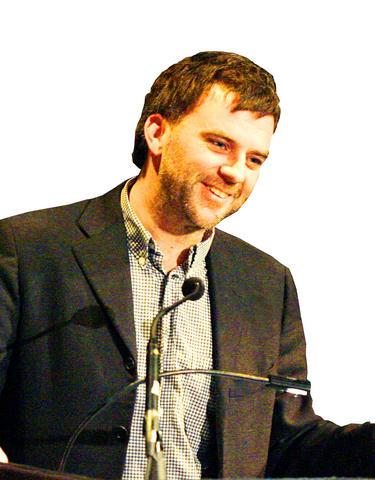The Berlin Film Festival announced the first of the movies that will compete for top honors at this coming February's festival with a raft of films from China, Brazil, Mexico, Britain, the US, Poland and Germany.
In Love We Trust (左右) from Chinese director Wang Xiaoshuai (王小帥), There Will Be Blood from US director Paul Thomas Anderson and Katyn from Oscar-winning Polish director Andrzej Wajda were all included in the lineup.
Never shy of tackling highly charged international political issues, organizers have also selected Oscar-winning documentary filmmaker Errol Morris' new movie S.O.P. Standard Operating Procedure, which examines abuse and torture of suspected terrorists at the hands of US forces at the Abu Ghraib prison.

PHOTO: AP
Also scheduled to premier at the 2008 Berlinale will be Kirschblueten - Hanami (Cherry Blossoms - Hanami) from leading German director Doris Doerrie and Brazilian box office hit Tropa de Elite (The Elite Squad) from director Jose Padilha.
Now in its 58th year, the Berlinale is one of the world's top three festivals along with Cannes and Venice.
US Commerce Secretary Carlos Gutierrez called on China to end its annual quota on foreign film imports.

PHOTO: AP
Gutierrez, in China for trade talks, said Beijing had imposed a routine temporary suspension on foreign film imports. China generally limits foreign film imports to about 20 a year to protect domestic filmmakers.
Last week, the Hollywood trade magazine Variety reported that China was banning all Hollywood movies for three months to protect local films. It said the ban would last until the end of February, but may be extended until May.
The report did not identify its sources and was quickly denied by Zhang Pimin (張丕民), deputy director-general of China's Film Bureau and the vice president of import and export business at state-run China Film Group.
A satirical Palestinian film that reverses the roles of occupier and occupied is one of three full-length feature films, along with a few shorts, shot in Palestine this year with relatively large budgets.
Enas Muthaffar's short film, Occupazion, shows Israeli protesters angrily waving blue and white Israeli flags while they demonstrate against Palestinian rule, one of them, wearing a headscarf, parodied of Palestinians'.
"Each Palestinian film made is a miracle," said George Khleifi, co-author of a book on the subject.
There's little official support for filmmakers, but Annemarie Jacir, director of Salt of this Sea, shot in the West Bank this year, obtained European funding of US$1.2 million.
The films tell stories through Palestinian eyes, trying to get beyond the simplicity of news coverage, which the artists say often reduces Palestinians to either militants or victims.
"Humor, passion, beauty, all of it is overlooked," said director Najwa Najjar, who just completed shooting a feature-length film about a female Palestinian dancer whose husband is sent to an Israeli prison.
Bollywood actor Sanjay Dutt is spending time with his family and friends before returning to work less than two weeks after being granted bail in an illegal weapons possession case, a news report said.
India's top court granted Dutt, a well-known actor, bail pending an appeal of his conviction on charges of unlawful possession of three automatic rifles and a pistol.
"I am enjoying the luxury of time before I get down to serious work," Dutt told the Times of India newspaper.
The actor said he needed to unwind before filming EMI, an acronym for easy monthly installments, in which he plays a loan recovery agent used by a bank to make defaulters pay up.
His last film was the 2006 hit Lage Raho Munnabhai (Carry on Munnabhai). A trial court sentenced Dutt to six years in prison in July for possessing weapons supplied by men subsequently convicted in the 1993 Mumbai bombings.
Dutt was acquitted in November 2006 of terrorism and conspiracy charges, but the actor has served nearly 20 months over three separate stretches in prison since he was first arrested in 1994.
"I have a strong belief in God, my loved ones, my fans, and most importantly in myself," Dutt said. "I will bounce back again."

Behind a car repair business on a nondescript Thai street are the cherished pets of a rising TikTok animal influencer: two lions and a 200-kilogram lion-tiger hybrid called “Big George.” Lion ownership is legal in Thailand, and Tharnuwarht Plengkemratch is an enthusiastic advocate, posting updates on his feline companions to nearly three million followers. “They’re playful and affectionate, just like dogs or cats,” he said from inside their cage complex at his home in the northern city of Chiang Mai. Thailand’s captive lion population has exploded in recent years, with nearly 500 registered in zoos, breeding farms, petting cafes and homes. Experts warn the

No one saw it coming. Everyone — including the Chinese Nationalist Party (KMT) — expected at least some of the recall campaigns against 24 of its lawmakers and Hsinchu Mayor Ann Kao (高虹安) to succeed. Underground gamblers reportedly expected between five and eight lawmakers to lose their jobs. All of this analysis made sense, but contained a fatal flaw. The record of the recall campaigns, the collapse of the KMT-led recalls, and polling data all pointed to enthusiastic high turnout in support of the recall campaigns, and that those against the recalls were unenthusiastic and far less likely to vote. That

The unexpected collapse of the recall campaigns is being viewed through many lenses, most of them skewed and self-absorbed. The international media unsurprisingly focuses on what they perceive as the message that Taiwanese voters were sending in the failure of the mass recall, especially to China, the US and to friendly Western nations. This made some sense prior to early last month. One of the main arguments used by recall campaigners for recalling Chinese Nationalist Party (KMT) lawmakers was that they were too pro-China, and by extension not to be trusted with defending the nation. Also by extension, that argument could be

Aug. 4 to Aug. 10 When Coca-Cola finally pushed its way into Taiwan’s market in 1968, it allegedly vowed to wipe out its major domestic rival Hey Song within five years. But Hey Song, which began as a manual operation in a family cow shed in 1925, had proven its resilience, surviving numerous setbacks — including the loss of autonomy and nearly all its assets due to the Japanese colonial government’s wartime economic policy. By the 1960s, Hey Song had risen to the top of Taiwan’s beverage industry. This success was driven not only by president Chang Wen-chi’s